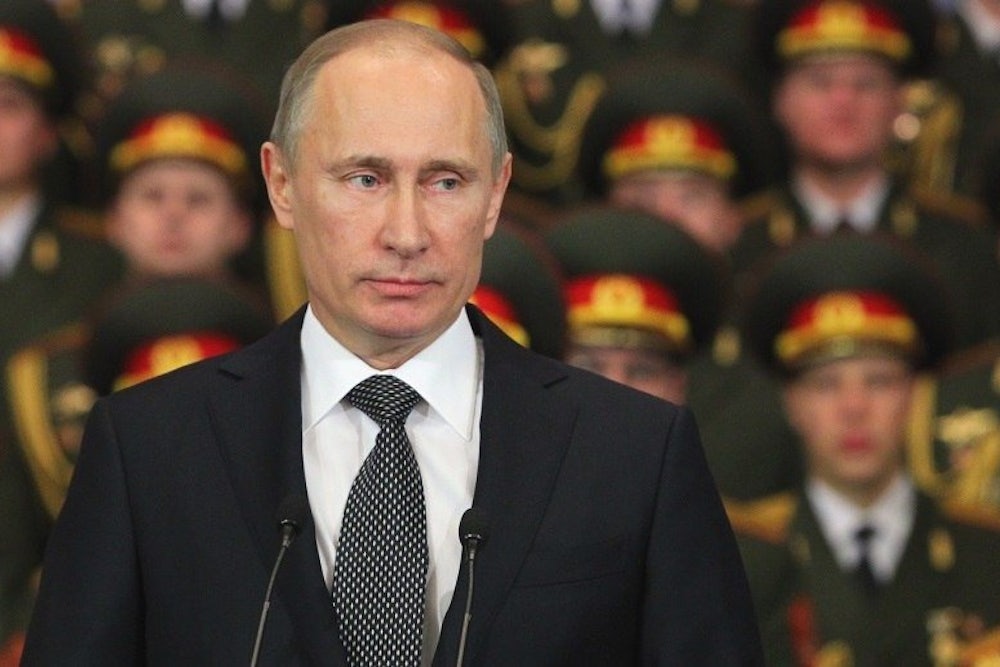As the White House struggles, agonizingly, down the road to striking Syria, Moscow has put on its own sideshow, railing against yet another American misadventure in a mysterious and tangled region. Russian ships have started churning the Mediterranean's waters again, ostentatiously getting into position. Russian officials warned obliquely of "catastrophic consequences" should the U.N. Security Countil be bypassed. Dmitry Rogozin, a blustery deputy prime minister who is close to Vladimir Putin, came out to deride the U.S., saying it behaved in the Muslim world "like a monkey with a hand grenade." Meanwhile, Russian state TV, setting aside its programming of bread and circuses, has detailed the ways in which America is again circumventing international institutions and, worse, undermining international law. In the most extraordinary example of the Russian media's exuberance, ITAR-TASS, the state news wire, quoted Carla Del Ponte, a member of the UN commission looking into the gas attacks, as saying that the chemical weapons used in Ghouta had been fired by "the paramilitaries of Syria's irreconcilable opposition." The only problem was that Del Ponte had made no such statement, and still, ITAR-TASS, whose story was picked up across Russian news outlets, declined to issue a correction.
The message was the old, familiar no, this time buttressed by some menacing-looking warships.
And as always, it means nothing.
What can Russia really do? Well, not much. It can, and will, veto any resolution authorizing the use of force in Syria. In fact, its representative has already walked out of a meeting in which Samantha Power, America's ambassador to the U.N., called for "immediate action." And you know what? That's both utterly predictable and not insurmountable. The most helpful Russians have been on things like this is simply abstaining on the resolution allowing the use of force in Libya. "They have the power when they say 'no,' but when we say 'no,' they lose their power," says a Senate foreign policy staffer.
Okay, but tactically speaking: Will the Russians use those warships? Fat chance. The state of Russia's military and Russia's navy is notoriously terrible, and, for all their talk, the last thing Russia wants to do is engage in a game of battleship with the U.S.
What about those arms shipments? Well, given Russia's insistence that they're simply fulfilling weapons contracts and that, since there's no embargo on the Syrians, they are not in violation of any international laws, they have, are, and will keep supplying weapons to Assad. Likely, their only real reaction will be to step up shipments of small arms, like anti-tank missiles and launchers, but, as a Reuters investigation shows, they've been doing that anyway, nearly doubling their shipments to Assad since April.
Some have raised the spectre of an outstanding supply of S-300's, a Russian-made long-range anti-aircraft missile system that can hit multiple targets at once, that is said to be a game-changer. Israel even said that it would attack the stuff on delivery to Assad. "It's indeed a serious weapon," Putin said in June, when, seeming to recognize Western concerns, he denied that Bashar al-Assad had received the missiles for which he'd made a down payment. "We don't want to throw the region off-balance." Assad doesn't have the S-300's and he's unlikely to get them now. Even if he does, they take time to be set up and to train people to operate them. Moreover, they won't be used against the rebels; they are insurance against a Western airstrike, and, now, when such an airstrike seems imminent, Assad doesn't have them. Oh, and they've never been tested in battle.
Russia could theoretically pull it's acquiesence for the Northern Distribution Network on which the U.S. depends quite heavily to get materiel into and out of Afghanistan. Okay, but America's out of there soon anyway—as in, it stops being a lever—and besides Russia makes plenty of money off the venture.
So what happens when the Tomahawks start flying? How will Russia react? "It won't," says Georgy Mirsky, a prominent Russian Middle East expert. "It doesn't need to react. Why should it react? No one's touching us, no one's bothering us. Russia will sit back and observe as America gets into another terrible Middle Eastern war. Russia will give Assad all the weapons he needs, and the fighting strength he'll get from Hezbollah and Iran. They have plenty to fight with."
Russians, Mirsky correctly points out, don't really care about what happens in Syria, and, if Russia loses Assad and Syria, well, Syria's not as precious an ally as we imagine them to be. "What do we have in Syria?" Mirsky jibed. "One tiny naval base? Arms sales? We have plenty of arms clients around the world. India alone buys many, many more weapons than Syria, by a factor of tens." Warships or no warships, in other words, when things really flame up, Putin is not coming to the rescue.
If the West attacks and Putin continues to heckle from the sidelines, Mirsky explains, it'll be a propaganda coup. "It'll show people that here, again, America is showing its aggressive face," he said, explaining that two decades (after the end of the Cold War) is not a very long time. "And Putin shows again that he is a strong leader that raised Russia up off its knees, and that he has never and will never dance to an American tune."
Mirsky's advice? Don't pay attention to Russia. Of all the obstacles on Obama's path to Damascus, Putin is not one of them. "All of this is for domestic consumption," he says.
Says the Senate staffer, "They'll just find a way to bang on their high chair, and that'll be the end of that."
